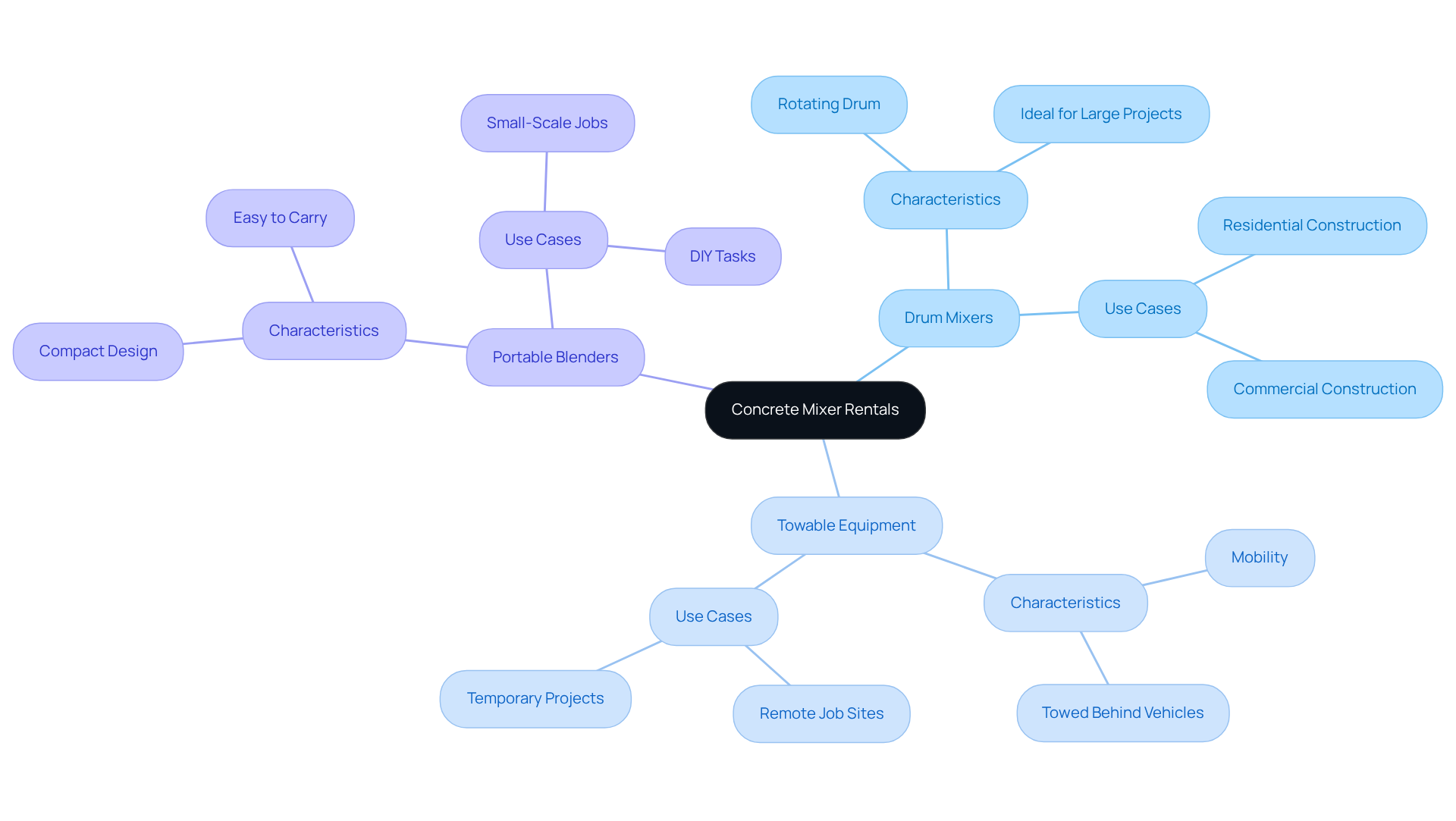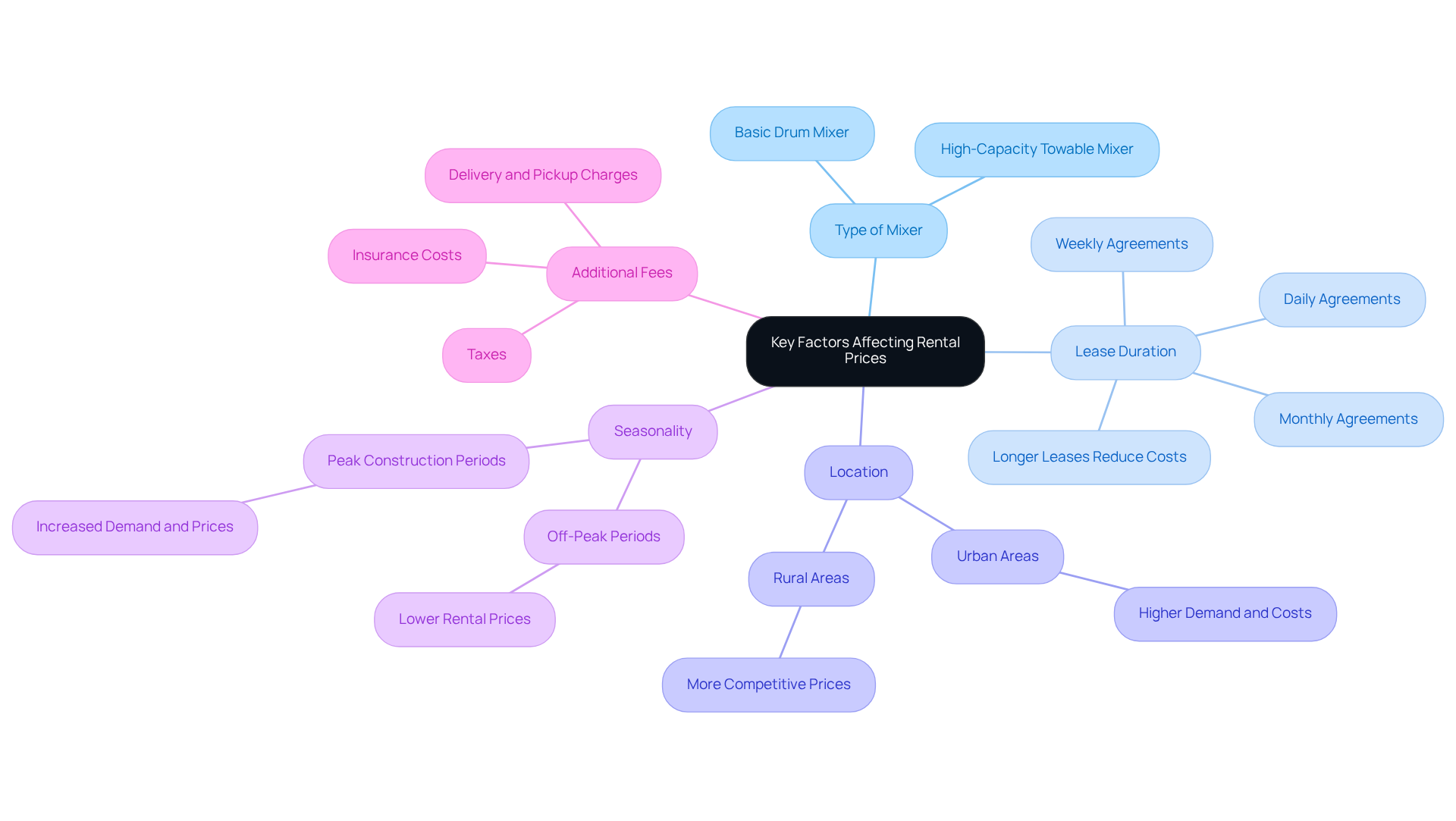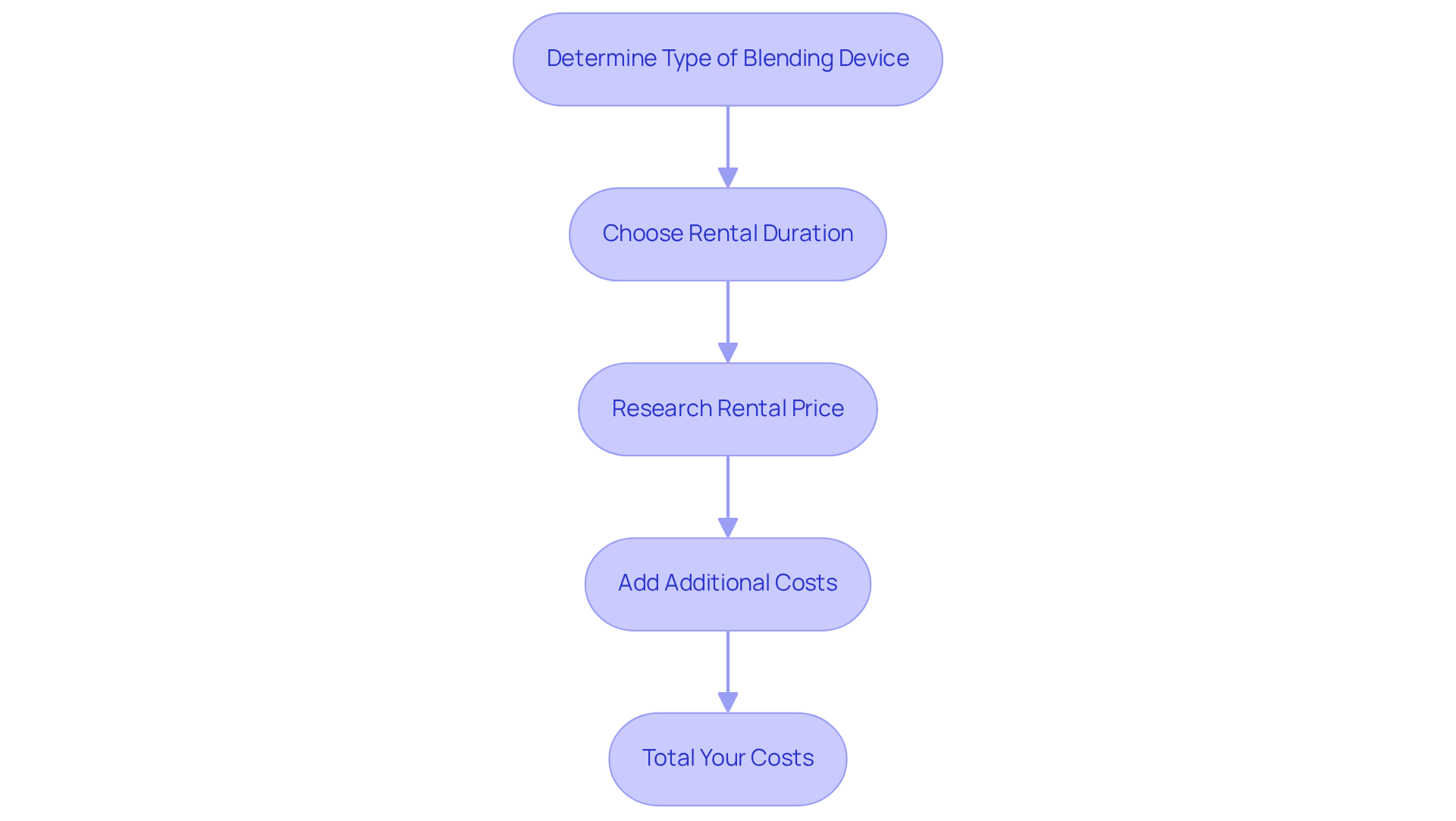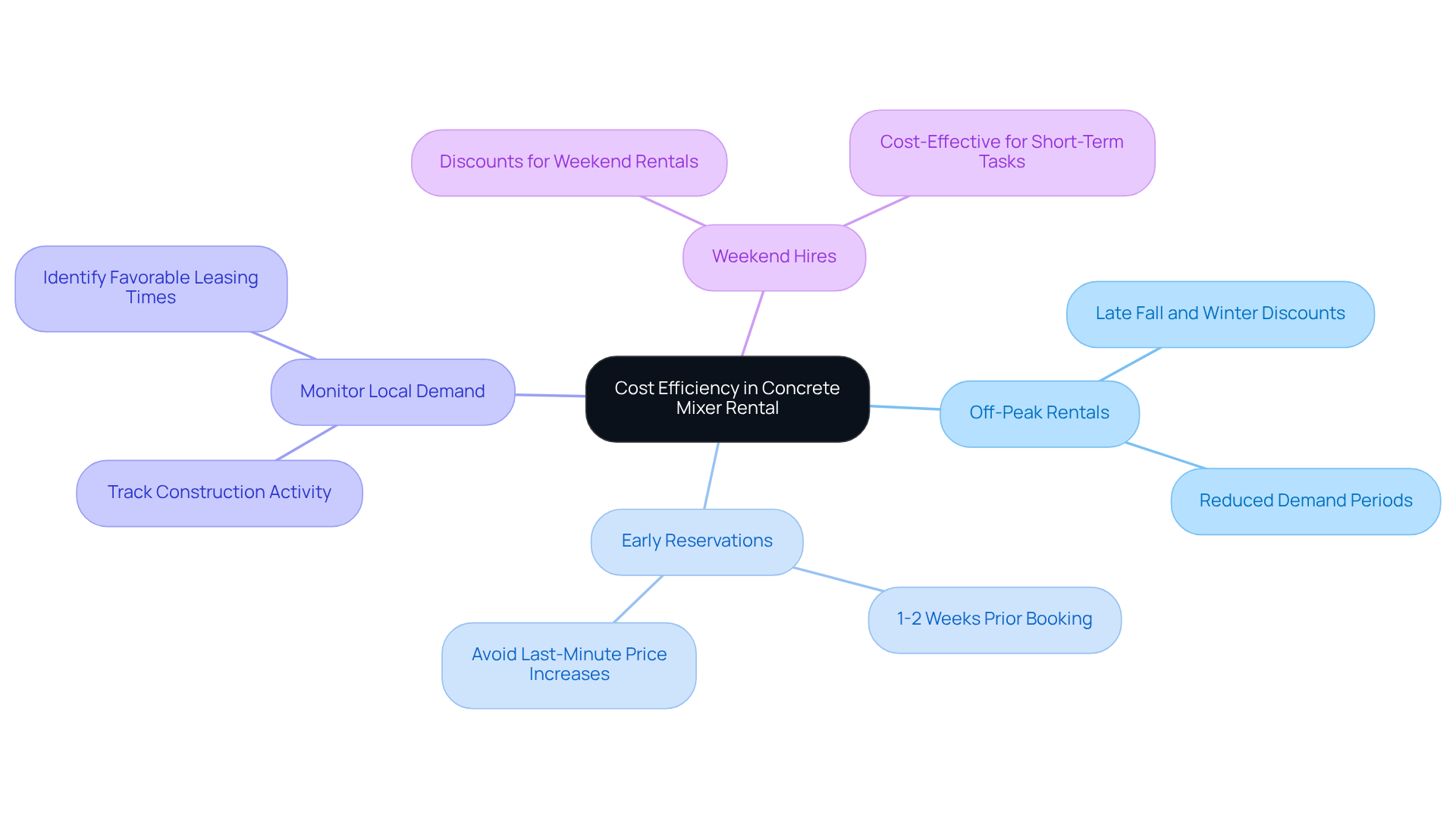Overview
The primary factors that influence concrete mixer rental prices encompass the following elements:
- Type of mixer
- Lease duration
- Location
- Seasonality
- Additional fees
Understanding these elements is crucial, as they directly affect costs. For instance, longer lease agreements typically lead to reduced daily rates, while urban areas often command higher prices due to increased demand. This comprehensive framework not only aids in effective budgeting but also ensures that customers can make informed decisions regarding their rental needs.
Key Highlights:
- Concrete mixers are essential in construction, mixing cement, aggregate, and water.
- Types of mixers include drum mixers (common for large projects), towable equipment (for mobility), and portable blenders (for DIY tasks).
- Renting mixers is cost-effective for temporary projects, allowing access to quality equipment without ownership costs.
- In 2025, average rental prices are expected to be competitive, with the U.S. holding a significant share of the global rental market.
- Key factors influencing rental prices include mixer type, lease duration, location, seasonality, and additional fees.
- Longer lease periods generally reduce daily costs, and urban areas may have higher prices than rural regions.
- To calculate rental costs, identify the mixer type, choose the rental duration, research prices, add additional costs, and total expenses.
- Strategies for cost efficiency include renting during off-peak seasons, reserving early, monitoring local demand, and considering weekend hires.
Introduction
Understanding the intricacies of concrete mixer rentals is crucial for effective budgeting in construction projects. As demand for these essential machines rises, the rental market emerges as a cost-effective solution, enabling access to high-quality equipment without the burdens of ownership. However, navigating the myriad factors that influence rental prices—such as mixer type, lease duration, and seasonal fluctuations—can be challenging. Construction professionals must strategize their rentals effectively to maximize efficiency while minimizing costs.
Explore the Basics of Concrete Mixer Rentals
Concrete machines are indispensable tools in construction, expertly combining cement, aggregate, and water to produce concrete. Various types of machines cater to distinct project requirements:
- Drum Mixers: The most prevalent type, featuring a rotating drum that efficiently mixes ingredients, making them ideal for larger projects.
- Towable Equipment: Designed for mobility, these devices can be towed behind a vehicle, making them perfect for remote job sites.
- Portable Blenders: Compact and easy to carry, these devices are well-suited for DIY tasks or small-scale jobs.
Renting a cement machine is an economical solution for temporary projects, especially when factoring in the concrete mixer rental price, which allows access to top-notch equipment without the financial burden of ownership. In 2025, the average concrete mixer rental price is expected to be competitive, reflecting the growing demand for leasing services in the construction industry. Notably, the United States accounted for 25.7% of the global equipment rental market in 2023, underscoring the market's significance and potential for growth. Construction professionals frequently highlight the advantages of renting, mentioning that the concrete mixer rental price provides flexibility and the opportunity to utilize the latest technology without long-term commitments.
The importance of cement blending machines in construction cannot be overstated; they play a vital role in producing high-quality materials necessary for various applications, from residential buildings to large-scale infrastructure projects. The cement blending equipment market is projected to grow from USD 3.60 billion in 2025 to USD 4.40 billion by 2030, emphasizing the increasing demand for these tools in the sector. Successful projects often employ a variety of mixing equipment to meet specific needs, showcasing the adaptability and effectiveness that leasing options provide. Statements from construction experts further reinforce the benefits of leasing cement mixing equipment, highlighting their role in enhancing efficiency and reducing costs.

Identify Key Factors Affecting Rental Prices
Several key factors significantly influence the concrete mixer rental price.
- Type of Mixer: The capabilities and costs of mixers vary widely. A basic drum mixer typically incurs lower leasing costs compared to a high-capacity towable mixer, designed for larger projects that demand greater efficiency. Understanding the type of mixer required is essential for making informed decisions about the concrete mixer rental price.
- Lease Duration: The length of the lease period plays a crucial role in determining costs. The concrete mixer rental price can vary significantly among daily, weekly, and monthly agreements, with longer periods often leading to reduced daily costs. Determining the concrete mixer rental price and leasing duration is vital for precise budgeting. Industry insights indicate that the concrete mixer rental price fluctuates based on the duration the equipment is needed, underscoring the importance of strategic planning.
- Location: Geographic factors also impact pricing. Urban regions generally experience higher housing costs due to increased demand and operational expenses, while rural areas may offer more competitive prices, similar to the differences seen in concrete mixer rental price. For instance, the construction machinery leasing market in North America is projected to expand considerably, driven by urbanization and the rising need for leases.
- Seasonality: Rental prices are subject to seasonal fluctuations. During peak construction periods, demand surges, leading to an increase in concrete mixer rental price. Conversely, off-peak periods may present opportunities for lower concrete mixer rental prices. As noted by industry specialists, understanding these seasonal trends can significantly aid in developing effective leasing strategies.
- Additional Fees: It's crucial to consider potential extra charges that can elevate the overall leasing cost. Delivery and pickup charges, insurance, and taxes should all be factored into the total expense to prevent unexpected financial burdens. Awareness of the concrete mixer rental price and other additional costs is essential for effective budgeting.
By integrating these elements into your decision-making process, construction experts can make educated choices regarding equipment leases, ultimately enhancing their financial planning and strategy.

Calculate Your Concrete Mixer Rental Costs
To accurately calculate your concrete mixer rental costs, follow these essential steps:
- Determine the Type of Blending Device Needed: Identify the specific kind of blending device that aligns with your project requirements, such as portable or stationary models, as different types can significantly affect pricing.
- Choose the Rental Duration: Decide how long you will need the device. The concrete mixer rental price in 2025 generally varies from $50 to $150 per day, with extended leasing periods often providing better rates. Be aware that seasonal demand can increase leasing costs by 20-30%. The concrete mixer rental price is an important factor to consider during peak periods.
- Research the Concrete Mixer Rental Price: Investigate local leasing companies for their pricing. For example, a 9-cubic foot gas concrete mixer can be rented for approximately $95 per day or $395 per week.
- Add Additional Costs: Include any extra fees such as delivery, pickup, and maintenance costs. Delivery fees can vary, generally ranging from $20 to $100. Furthermore, take into account possible concealed expenses such as insurance and security deposits, which can increase 10-30% of the leasing fee.
- Total Your Costs: Sum all the costs to determine your overall expense. This comprehensive approach will help you stay within your budget and ensure that you are prepared for any unexpected expenses.
By adhering to these steps, you can efficiently handle your budget for equipment leasing, aligning your financial planning with requirements. As financial expert Suze Orman emphasizes, having a clear understanding of your expenses is key to achieving financial freedom. Moreover, Robert Kiyosaki underscores that your financial strength is significantly reliant on your capacity to manage your cash flow, highlighting the importance of budgeting in construction endeavors.

Plan Your Rental Timing for Cost Efficiency
To maximize cost efficiency when renting a concrete mixer, consider implementing these effective strategies:
- Rent During Off-Peak Seasons: Late fall and winter months typically witness a decline in demand for construction equipment, leading to reduced rental rates. This seasonal trend can result in significant savings for your project, particularly in terms of concrete mixer rental price.
- Reserve Early: Securing your equipment 1-2 weeks prior to your task start date can help avoid last-minute price increases while ensuring the availability of the tools you require. Making early reservations is a proactive approach to managing costs, especially regarding concrete mixer rental price.
- Monitor Local Demand Trends: Keeping an eye on local construction activity can provide valuable insights into optimal leasing times. A noticeable decline in initiatives may indicate a favorable period for leasing, as the concrete mixer rental price could be reduced, allowing you to maximize your budget.
- Consider Weekend Hires: Some leasing companies offer discounts for weekend hires, making this a cost-effective option for short-term tasks. This strategy can be particularly advantageous for contractors aiming to stretch their budgets further by optimizing the concrete mixer rental price.
By implementing these strategies, construction project managers can effectively manage their rental costs while ensuring they have the necessary equipment for successful project completion.

Conclusion
Understanding the various factors that influence concrete mixer rental prices is essential for effective budgeting in construction projects. Recognizing the types of mixers available, the impact of lease duration, geographical pricing variations, and seasonal trends empowers construction professionals to make informed decisions that align with their financial goals. This knowledge not only aids in selecting the right equipment but also ensures that projects remain economically viable without sacrificing quality.
Key insights discussed highlight the importance of strategic planning when renting concrete mixers. Factors such as the type of mixer, rental duration, and additional fees can significantly affect overall costs. By calculating expenses accurately and considering off-peak rental periods, project managers can optimize their budgets and avoid unexpected financial burdens. Furthermore, the projected growth of the concrete blending equipment market emphasizes the relevance of these insights for future planning.
Ultimately, the significance of understanding concrete mixer rental price factors cannot be overstated. By applying the strategies outlined, construction professionals can enhance their financial planning and maximize efficiency in their projects. Embracing a proactive approach to rental timing and cost management will not only lead to better budgeting outcomes but also contribute to the successful completion of construction endeavors.
Frequently Asked Questions
What are the main types of concrete mixers available for rent?
The main types of concrete mixers available for rent include Drum Mixers, which are the most common and ideal for larger projects; Towable Equipment, designed for mobility and suitable for remote job sites; and Portable Blenders, which are compact and perfect for DIY tasks or small-scale jobs.
Why should someone consider renting a concrete mixer?
Renting a concrete mixer is an economical solution for temporary projects, allowing access to high-quality equipment without the financial burden of ownership. It also provides flexibility and the opportunity to use the latest technology without long-term commitments.
What is the expected average rental price for concrete mixers in 2025?
The average concrete mixer rental price in 2025 is expected to be competitive, reflecting the growing demand for leasing services in the construction industry.
How significant is the equipment rental market in the United States?
In 2023, the United States accounted for 25.7% of the global equipment rental market, highlighting its significance and potential for growth.
What is the projected growth of the cement blending equipment market?
The cement blending equipment market is projected to grow from USD 3.60 billion in 2025 to USD 4.40 billion by 2030, indicating an increasing demand for these tools in the construction sector.
How do concrete mixing machines contribute to construction projects?
Concrete mixing machines play a vital role in producing high-quality materials necessary for various applications, from residential buildings to large-scale infrastructure projects.
What benefits do construction professionals see in leasing cement mixing equipment?
Construction professionals highlight that leasing cement mixing equipment enhances efficiency and reduces costs, allowing for the use of a variety of mixing equipment tailored to specific project needs.




